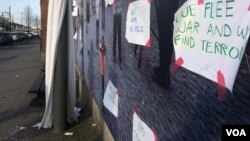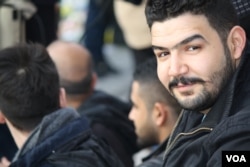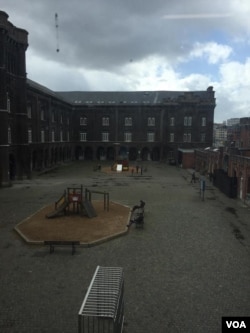Alongside a neighborhood best known for being home to some of the Brussels and Paris bombers, is an old barracks-turned-refugee-camp with handmade signs pasted over a poster on the red brick wall.
They say things like “No no terrorism” and “We flee war and we find terror.”
In trying to make sense of last week's Brussels attack that killed 35 people and wounded more than 300 others, some analysts say the isolation of Muslims in neighborhoods like Molenbeek played a role in radicalizing some Belgian youth of foreign decent.
But asylum-seekers living in the former military barracks nearby say, as newcomers on a continent increasingly hostile to Muslims, they wouldn't choose isolation.
It’s not that they are afraid they will somehow be magically radicalized against their will, but they want to stave off growing anti-Islamic sentiment by getting to know people and studying local languages.
“I just want to share my feelings with people and say that I am against terrorism,” said 25-year-old Mustafa Mohammed, an Iraqi refugee, at a vigil on Saturday. The temporary memorial, decorated with flags from all over the world has become a symbol of international solidarity with the victims of the bombings.
Despite an outpouring of sympathy from Islamic communities in Brussels, fear of people who appear to be from the Middle East and North Africa has also increased since the attacks in Paris that killed 130 people last year, adds Mohammed.
“Sometimes when I walk, people look at me like I want to bomb myself,” said Mohammed.
The next day, at the same memorial, scores of right-wing protesters storm in shouting anti-Islamic slogans and saluting Nazi style. Already in the area, Mohammed joins mourners on the stairs, cheering the police and the army as they push back the protest with water guns and rows of security forces in riot gear.
A Belgian woman paints his cheek in black, yellow and red, the colors of Belgium’s flag. The growth of anti-immigration and anti-Islam movements in Europe is frightening, he said, but support from other segments of society is equally heartening.
“After the attack, people start to understand terrorism,” he said. “I was afraid people would say ‘You are Muslim, you are a terrorist. Go out.’”
Brussels attackers weren't refugees
After the Brussels attack, several Western leaders called for tighter restrictions on refugees, despite the fact that none of the identified attackers was a refugee.
In Germany, the Interior Minister called for sanctions against refugees that do not sufficiently assimilate. Poland's president announced he supports a government decision to renege on a deal to take in thousands of refugees. And American presidential candidate Ted Cruz called for a freeze on taking in refugees from areas impacted by Islamic State or al-Qaida as well as patrols of Muslim neighborhoods.
For refugees and other migrants, the onslaught of fear seems bizarre. So far, the accused attackers in Brussels, like those accused of the November attacks in Paris, have been born and raised in Europe.
And no one hates Islamic State (IS) militants more than people that fled the Middle East, say some refugees, who gave up everything just to get out alive. Additionally, no one is more sympathetic to victims, they add, because they know how it feels to live in a place where innocent people are killed in attacks.
“We don’t want this for anyone, not just for us,” says 22-year-old Mohammad, who months earlier fled IS militants who killed his father and brother. “What’s happened here is what is happening in our countries.”
Earlier that day, relatives at home told him American-led coalition bombs intended to fight IS struck a university, killing children and other civilians.
Despite the growth of anti-Islamic political groups in Europe, Mohammad said Brussels remains largely friendly. “It’s an international city,” he said. “I don’t feel like a stranger.”
Assimilate where?
For many refugees in Europe, the first challenge is language. In Belgium, there are two main languages, French and Dutch. Which language you study determines where you will work and live.
The Dutch-speaking Flemish areas are reputed to have more work and the French-speaking areas are reputed to be more welcoming to foreigners. However, choosing a language to study is a toss-up, said Mustafa Mohammed, at the memorial after the near-riot died down.
The trick is learning the language as soon as possible. “Somali people are smart,” he explains. “They start studying Dutch in two days after they arrive.”
Some groups of refugees are more likely to assimilate faster than others, he adds. Groups coming from modern urban areas adapt more quickly, especially if they already speak English. Other groups, sharing no common language with people on the streets, remain deeply isolated, adapting to neither European food or lifestyles.
In other parts of Europe, refugee housing is often deep in the countryside, and asylum-seekers complain that they want to assimilate, but they rarely see local people to talk to.
For his part, Mohammed is studying French because he wants to stay in Brussels, a mostly French city.
“Brussels,” he said, “is life.”







